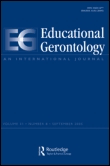
EDUCATIONAL GERONTOLOGY
Scope & Guideline
Advancing knowledge at the intersection of education and aging.
Introduction
Aims and Scopes
- Lifelong Learning and Education for Older Adults:
The journal emphasizes the significance of lifelong learning as a tool for enhancing the quality of life and well-being among older adults, promoting educational programs tailored to their needs. - Intergenerational Learning and Engagement:
A core focus is on fostering intergenerational connections through educational initiatives that promote understanding and collaboration between younger and older populations. - Social Inclusion and Empowerment:
The journal addresses issues related to social inclusion, empowerment, and the active participation of older adults in society, advocating for policies and practices that reduce ageism and enhance their societal roles. - Health and Well-being in Aging:
Research often explores the relationship between educational interventions and health outcomes, including mental health, cognitive function, and overall well-being among older adults. - Technology and Digital Literacy:
A growing area of focus involves equipping older adults with digital skills and knowledge to navigate the increasingly technology-driven world, facilitating their independence and social connectivity.
Trending and Emerging
- Digital Literacy and Technology Integration:
There is a marked increase in research addressing digital literacy and the integration of technology into educational practices for older adults, reflecting the necessity of equipping them with skills for modern communication and information access. - Mental Health and Emotional Well-being:
Recent publications increasingly focus on the mental health challenges faced by older adults, emphasizing educational interventions that support emotional well-being and resilience. - Health Promotion and Disease Prevention:
Studies concentrating on health education and promotion for older adults are on the rise, aiming to enhance health literacy and encourage proactive health behaviors among this demographic. - Qualitative Research Methodologies:
An emerging trend is the use of qualitative methodologies to gain deeper insights into the experiences, needs, and perspectives of older adults, allowing for more nuanced understandings of aging. - Interdisciplinary Approaches to Aging:
There is a growing emphasis on interdisciplinary research that combines insights from gerontology, education, health sciences, and social work to address complex issues related to aging.
Declining or Waning
- Traditional Educational Methods:
There is a noticeable decline in research focused on conventional teaching methods for older adults, as the journal increasingly shifts towards innovative and technology-enhanced learning approaches. - Age-Specific Stereotypes and Negative Portrayals:
The journal's focus on negative stereotypes associated with aging has waned, indicating a shift towards more positive representations and discussions surrounding aging and older adults. - Generalized Studies on Aging:
Broad, generalized studies on aging without specific educational or intervention components are becoming less frequent, as the journal prioritizes research with practical applications and educational frameworks.
Similar Journals
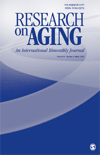
RESEARCH ON AGING
Connecting disciplines to unveil the intricacies of aging.RESEARCH ON AGING is a renowned academic journal dedicated to advancing the knowledge and understanding of aging and its multifaceted effects on health, society, and psychology. Published by SAGE PUBLICATIONS INC, this journal has been a pivotal resource since its inception in 1979, disseminating cutting-edge research and insights that shape the field of gerontology. With a commendable impact factor and esteemed rankings in Geriatrics and Gerontology (Q2), Health (social science) (Q1), and Social Psychology (Q2), it positions itself at the forefront of ongoing dialogues in these critical areas. The journal appeals to a diverse audience, including researchers, healthcare professionals, and students, who seek to explore the complexities of aging. Though access is not available through Open Access, RESEARCH ON AGING continues to be an essential platform for impactful research and multidisciplinary discussion, making it an invaluable asset for anyone interested in the social and health-related dimensions of aging through to 2024 and beyond.
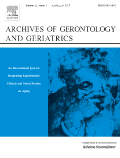
ARCHIVES OF GERONTOLOGY AND GERIATRICS
Advancing knowledge in aging and geriatric care.The Archives of Gerontology and Geriatrics, published by Elsevier Ireland Ltd, is a leading journal in the fields of Aging and Geriatrics and Gerontology. With an ISSN of 0167-4943 and an E-ISSN of 1872-6976, it has established itself as a crucial platform for disseminating high-quality research focused on the biological and psychosocial aspects of aging. The journal holds an impressive Q2 ranking in both Aging and Geriatrics and Gerontology, and a Q1 ranking in Gerontology and Health (Social Science) as of 2023, reflecting its significant impact in these disciplines. Additionally, the journal is ranked #33/371 in Social Sciences (Health) and #5/39 in Nursing (Gerontology) according to Scopus, showcasing its esteemed position in the academic community. Although currently not open access, the journal offers a wealth of research articles from 1982 to the upcoming 2025 that are vital for stakeholders including researchers, healthcare professionals, and students aiming to advance their understanding of aging processes and policies. Titles published within its pages contribute to shaping agendas in public health and gerontological practice, making it an essential resource for those involved in the study of the elderly population.
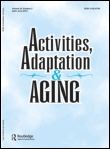
Activities Adaptation & Aging
Elevating gerontology through impactful research and practice.Activities Adaptation & Aging is a leading journal dedicated to the intersection of aging research, health professions, and gerontology, published by Routledge Journals, Taylor & Francis Ltd. With its origins dating back to 1981, this journal has established itself as a vital resource for scholars and practitioners alike, focusing on innovative approaches to enhance the quality of life for older adults. The journal’s inclusion in various prestigious Scopus ranks—such as being positioned in the 92nd percentile for Health Professions (miscellaneous)—reflects its significant impact in the field. Operating without open access, it provides essential insights and empirical research that are crucial for advancing knowledge and practices related to adaptation and engagement in aging. With a strong reputation built over the decades, Activities Adaptation & Aging continues to be an essential platform for disseminating research findings, fostering scholarly dialogue, and promoting effective interventions for aging populations.
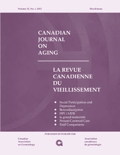
CANADIAN JOURNAL ON AGING-REVUE CANADIENNE DU VIEILLISSEMENT
Elevating the conversation on aging across Canada and beyond.Canadian Journal on Aging - Revue Canadienne du Vieillissement is a leading journal published by Cambridge University Press, dedicated to advancing the empirical understanding of aging and its multifaceted impacts on individuals and society. As a vital resource in its field since 1982 and continuing through 2024, this journal fosters discourse among researchers, practitioners, and policymakers with a keen interest in the demographics, health, and societal aspects of aging. It holds a distinguished position in the academic landscape, earning a Q1 ranking in Community and Home Care and Q2 rankings in Geriatrics & Gerontology, Gerontology, and Health (Social Science) as of 2023. Articles are rigorously peer-reviewed to uphold the highest academic standards, ensuring impactful contributions to aging studies. While the journal does not currently offer open access, it serves as an essential platform for sharing innovative research findings that shape the future of elder care and gerontological practice. With a focus on both Canadian contexts and broader international perspectives, the Canadian Journal on Aging provides critical insights that empower professionals and inspire future generations of scholars.

Aging Medicine and Healthcare
Advancing Knowledge to Enhance Elderly CareAging Medicine and Healthcare is a leading Open Access journal dedicated to advancing the understanding of geriatric health and the complexities of aging. Published by the Asia Pacific League Clinical Gerontology & Geriatrics, this innovative journal began its journey in 2019 and has since established itself as an important resource for healthcare professionals, researchers, and students interested in the fields of geriatrics and gerontology. With an impact factor that reflects its growing significance (ranked in the 21st percentile within its category), the journal aims to disseminate high-quality research and practical insights that can inform clinical practice and enhance patient care for aging populations. As an Open Access publication, it ensures that research findings are freely accessible, fostering collaboration and knowledge sharing among academics and practitioners globally. The journal is poised to be a vital platform for innovative studies, systematic reviews, and case reports that illuminate the challenges and opportunities in aging medicine.
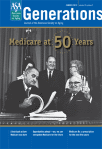
Generations
Empowering Generations Through Scholarly ExchangeGenerations, published by the American Society on Aging, serves as a vital interdisciplinary platform for scholars and practitioners within the field of aging and gerontology. With its ISSN of 0738-7806 and E-ISSN of 2694-5126, this journal has been a valuable resource since its inception in 1985, connecting research and practice across converging years and advancing discussions surrounding the complexities of aging and lifespan studies. Although classified in the Q4 quartile for categories such as Geriatrics and Gerontology, Life-span and Life-course Studies, and Public Health, its contributions are increasingly relevant in a rapidly aging society. The journal’s emphasis on critical issues surrounding aging makes it essential reading for health professionals, policy makers, and researchers dedicated to enhancing the quality of life for older adults. As it continues its publication journey up to 2024, Generations remains committed to fostering scholarly discourse and offering innovative insights in this crucial area of study.
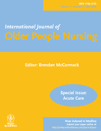
International Journal of Older People Nursing
Exploring the Future of Care for Seniors.The International Journal of Older People Nursing is a pivotal publication in the field of gerontology, focusing on the unique nursing care and health challenges faced by older adults. Published by WILEY and based in the United Kingdom, this journal aims to disseminate innovative research and practice insights from 2010 to 2024, making it an essential resource for academics and practitioners alike. With an impressive 2023 Category Quartile of Q2 in Gerontology, the journal ranks in the top tier of its field, placing it at 15th among 39 journals in Nursing Gerontology according to Scopus. The journal is committed to providing a platform for rigorous scientific inquiry, facilitating improvements in nursing practices, and promoting evidence-based care for older adults. Researchers, professionals, and students can benefit from the high-impact contributions that address the complexities and richness of aging, thus enhancing the quality of care and life for older populations.

EXPERIMENTAL AGING RESEARCH
Exploring the Frontiers of Aging ResearchEXPERIMENTAL AGING RESEARCH, published by Taylor & Francis Inc., is a leading journal that has been at the forefront of aging research since its inception in 1975. With an ISSN of 0361-073X and an E-ISSN of 1096-4657, this journal has earned a notable reputation, including a Q3 ranking in the field of Aging and impressive Q1 and Q2 rankings in Arts and Humanities and Geriatrics and Gerontology respectively. This positions the journal within the top percentile of its category, highlighting its significant impact and contribution to the scientific community. Covering a broad scope that intersects various disciplines, EXPERIMENTAL AGING RESEARCH aims to disseminate pioneering research, foster interdisciplinary collaboration, and provide a platform for innovative studies that enhance understanding of the aging process. While it currently does not offer Open Access, researchers and academics can access its rich repository of knowledge that spans multiple facets of aging, from physiological changes to psychological impacts. As the field of aging continues to evolve, this journal remains an essential resource for researchers, professionals, and students dedicated to advancing knowledge and practices concerning aging and longevity.
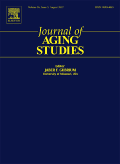
JOURNAL OF AGING STUDIES
Shaping the Future of Aging ResearchJOURNAL OF AGING STUDIES is a leading publication dedicated to the interdisciplinary exploration of aging, providing a platform for researchers, professionals, and students interested in the complex dynamics of aging in contemporary society. Published by Elsevier Science Inc, this esteemed journal has established itself as a key resource in various categories, achieving a Q1 ranking in Issues, Ethics and Legal Aspects and a Q2 ranking in multiple health-related disciplines as of 2023. The journal focuses on a broad range of topics, including health policy, social sciences, and life-span studies, contributing significantly to discussions surrounding aging through its rigorous peer-reviewed articles and comprehensive research studies since its inception in 1987. With an ISSN of 0890-4065 and an E-ISSN of 1879-193X, it serves as an essential reference for academic and professional audiences, and remains committed to advancing knowledge and policy in the field of aging.
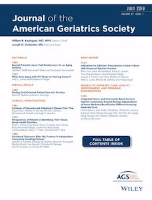
JOURNAL OF THE AMERICAN GERIATRICS SOCIETY
Shaping the Future of Aging Research and PolicyJOURNAL OF THE AMERICAN GERIATRICS SOCIETY, published by Wiley, stands as a leading resource in the field of geriatrics and gerontology. Established in 1953 and converging into a comprehensive academic platform through 2024, this esteemed journal is recognized for its high impact, holding a Q1 ranking in its category for 2023. It serves as a vital conduit for innovative research, clinical practices, and policy discussions aimed at improving the health and well-being of older adults. With a commitment to advancing geriatric medicine, the journal contributes significantly to the ongoing dialogue among researchers, healthcare professionals, and students dedicated to this rapidly evolving field. Although currently not offering open access options, the journal remains invaluable for those seeking to access pivotal studies and reviews that shape the future of geriatrics.